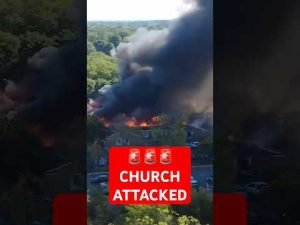In the quiet town of Grand Blanc, Michigan, a shocking event unfolded that left a community reeling and a nation re-evaluating its priorities. On a Sunday morning, when folks were supposed to gather in peace at The Church of Jesus Christ of Latter-day Saints, tragedy struck. A shooter drove his truck straight into the church, opened fire on the congregation, and then set the building ablaze. It’s a tale as old as time, or at least one that feels like it’s becoming all too familiar: an attack on a place of worship, once again pointing to a disturbing trend against Christian communities.
Interestingly, if this attack had happened to, say, a mosque or synagogue every week, you can bet there would be a nationwide uproar. There would be government task forces springing into action, statements from high-ranking officials flooding your Twitter feed, and wall-to-wall media coverage. But for the grand old Christian churches? The silence is almost deafening. Perhaps it’s become too easy to overlook these incidents, swallowing the narrative that they’re isolated when the reality suggests a systemic assault on Christianity.
The shooter in this case didn’t just stop at a simple attack. He left behind a scene reminiscent of an action movie showdown, with plumes of smoke visible for miles and the church now a total loss. Initial reports confirmed multiple victims. Yet, somehow, there was an eerie disconnect between the gravity of the attack and the level of outrage in the broader public arena.
While brave local law enforcement worked to control the scene and the FBI swooped in for support, the destruction was already done. The heroic police managed the active shooter situation, but not before the attacker’s actions were felt deeply by those inside. People within the community had to face unimaginable fear as they witnessed this strike against their faith community. It’s tragic but also a glaring reminder of the hostility facing Christians, not just in Michigan, but across America.
At the heart of this incident is a call to action, not just to pray for the victims, although let’s agree they need it now more than ever, but also to begin a conversation about the attacks on Christian communities in the U.S. This isn’t a niche issue—it’s part of a growing trend. As we piece together the motivations and plans of such attackers, let’s ask the hard-hitting questions: Why is Christianity under sustained attack, and what are we going to do about it? It’s beyond time to connect the dots and confront this issue head-on before the next Sunday in America brings another heartbreaking headline.







